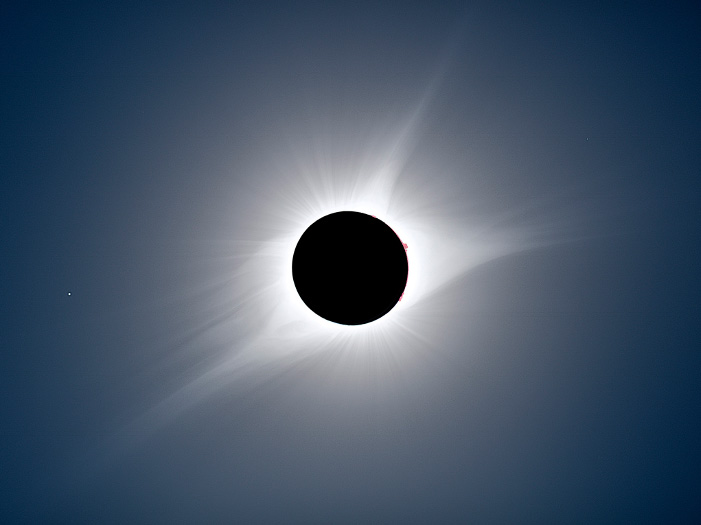The solar eclipse on April 8, 2024: a show not to be missed!
Astrophysicists from across Quebec, gathered at the Center for Research in Astrophysics of Quebec, encourage you to see the solar eclipse on April 8, an astronomical show not to be missed!
On that day, tens of millions of people across North America will be able to see a total solar eclipse, the result of a perfect alignment between the Sun, Moon and Earth.

Photo of the solar corona during the total phase of the solar eclipse of August 21, 2017 seen from Oregon, USA. This image is composed of short-, medium- and long-exposure images to capture the enormous range of luminosity presented by the solar corona. This brief moment when the Sun will be completely hidden by the Moon can be admired unprotected. At all other times, a solar filter is required to observe or photograph the Sun. Credit: Rick Fienberg / TravelQuest International
Those within the band of totality will have the chance to enjoy a rare and unique multi-sensory experience, which many are calling the event of a lifetime. In Quebec, around 2.15pm, the Moon will gradually begin to hide the Sun. Then, just before 3.30pm, for a brief period of a few seconds to a few minutes depending on where you’re observing, the Sun will be completely hidden by the Moon, and darkness will set in: it will be night during the day! During this brief period of totality, it will also be possible to observe a grandiose phenomenon: the solar corona, that immense halo of extremely hot gas surrounding the Sun, whose faint brilliance is normally lost in the brightness of the daytime sky.
Anyone who has ever experienced such a total eclipse agrees that it’s an extraordinary and unforgettable experience. Nathalie Ouellette, a member of the Center for Research in Astrophysics of Quebec, saw a total solar eclipse in 2017 in the United States. She recounts: “The temperature dropped about ten degrees. The world was dark around me. I could even see some bright stars in the sky. The disk of the moon completely covered the Sun. At that moment, I felt intimately connected with the Universe and all these celestial bodies orbiting around us.”
David Lafrenière, Director of the Center for Research in Astrophysics of Quebec, says: “This will be my very first total eclipse, and I’m really looking forward to it! I can’t wait to observe this unique event with my family, friends and colleagues. I invite everyone to do the same.”

La trajectoire de l’éclipse du 8 avril 2024. Crédit : Guillaume Poulin | ASTROLab du Mont-Mégantic.
On average, there is a total eclipse on Earth every eighteen months. However, because the Moon’s shadow is so thin, the band it traces across the Earth’s surface is less than 200 km wide. It is therefore very rare to be precisely in the right place at the right time. The last total eclipse in Quebec took place in 1979, and the next one, after this one, won’t be until 2079.
Solar eclipses have played an important role in the history of science and astronomy in particular. Among other things, they have made it possible to study the sun’s corona, discover helium and confirm Einstein’s theory of general relativity. But more than a scientific event, a solar eclipse is a human event that calls us together to admire the cosmic ballet of the Sun, Moon and Earth.
There’s no need to fear this well-understood astronomical phenomenon. To be able to admire it, as on any sunny day, you must not stare directly at the Sun without adequate protection. So, to contemplate this spectacle, buy ISO-12312-2 certified glasses, including one of the hundreds of thousands of pairs distributed by our partner institutions, or observe the Sun indirectly. For those in the totality band, the highlight of the show, the brief moment when the Sun will be completely hidden by the Moon, can be admired without protection. In fact, you’ll need to remove your eclipse glasses to see the solar corona and night sky in daylight!
The solar eclipse on April 8, 2024 is a golden opportunity to experience science and grasp our place in the Universe. It’s an experience that will live forever in the minds of young and old alike!
On April 8, come out and enjoy the show!
Media contact
Frédérique Baron
Coordinator
Center for Research in Astrophysics of Quebec
frederique.baron@umontreal.ca, 514-343-6111 #3798
David Lafrenière
Director
Center for Research in Astrophysics of Quebec
david.lafreniere@umontreal.ca
Marie-Eve Naud
Trottier Institute for Research on Exoplanets
Center for Research in Astrophysics of Quebec
marie-eve.naud@umontreal.ca, 514-279-3222
Nathalie Ouellette
Trottier Institute for Research on Exoplanets
Observatoire du Mont-Mégantic
Center for Research in Astrophysics of Quebec
nathalie@astro.umontreal.ca, 613 531-1762
Julie Bolduc-Duval
Discover the Universe
Center for Research in Astrophysics of Quebec
julie@decouvertedelunivers.ca
Marie-Lou Gendron Marsolais
Université Laval
Center for Research in Astrophysics of Quebec
marielougm@gmail.com
